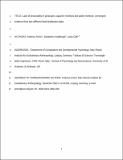Files in this item
Lack of prosociality in great apes, capuchin monkeys and spider monkeys : convergent evidence from two different food distribution tasks
Item metadata
| dc.contributor.author | Amici, Federica | |
| dc.contributor.author | Visalberghi, Elisabetta | |
| dc.contributor.author | Call, Josep | |
| dc.date.accessioned | 2016-04-19T10:30:11Z | |
| dc.date.available | 2016-04-19T10:30:11Z | |
| dc.date.issued | 2014-10-22 | |
| dc.identifier | 240324997 | |
| dc.identifier | cfb82175-49a4-4ac2-93c8-e44b5b0d7ed9 | |
| dc.identifier | 000341560300022 | |
| dc.identifier | 84939963149 | |
| dc.identifier | 000341560300022 | |
| dc.identifier.citation | Amici , F , Visalberghi , E & Call , J 2014 , ' Lack of prosociality in great apes, capuchin monkeys and spider monkeys : convergent evidence from two different food distribution tasks ' , Proceedings of the Royal Society B: Biological Sciences , vol. 281 , no. 1793 , 20141699 . https://doi.org/10.1098/rspb.2014.1699 | en |
| dc.identifier.issn | 0962-8452 | |
| dc.identifier.other | ORCID: /0000-0002-8597-8336/work/37477842 | |
| dc.identifier.uri | https://hdl.handle.net/10023/8637 | |
| dc.description | This work was conducted while the first author held a Humboldt Research Fellowship for Postdoctoral Researchers (Humboldt ID no. 1138999). | en |
| dc.description.abstract | Prosociality can be defined as any behaviour performed to alleviate the needs of others or to improve their welfare. Prosociality has probably played an essential role in the evolution of cooperative behaviour and several studies have already investigated it in primates to understand the evolutionary origins of human prosociality. Two main tasks have been used to test prosociality in a food context. In the Platforms task, subjects can prosocially provide food to a partner by selecting a prosocial platform over a selfish one. In the Tokens task, subjects can prosocially provide food to a partner by selecting a prosocial token over a selfish one. As these tasks have provided mixed results, we used both tasks to test prosociality in great apes, capuchin monkeys and spider monkeys. Our results provided no compelling evidence of prosociality in a food context in any of the species tested. Additionally, our study revealed serious limitations of the Tokens task as it has been previously used. These results highlight the importance of controlling for confounding variables and of using multiple tasks to address inconsistencies present in the literature. | |
| dc.format.extent | 9 | |
| dc.format.extent | 127004 | |
| dc.language.iso | eng | |
| dc.relation.ispartof | Proceedings of the Royal Society B: Biological Sciences | en |
| dc.subject | Prosocial behaviour | en |
| dc.subject | Primates | en |
| dc.subject | Other-regarding preferences | en |
| dc.subject | Apes | en |
| dc.subject | Monkeys | en |
| dc.subject | Tamarins saguinus-oedipus | en |
| dc.subject | Unrelated group members | en |
| dc.subject | Cebus-Apella | en |
| dc.subject | Human cooperation | en |
| dc.subject | Token transfers | en |
| dc.subject | Chimpanzees | en |
| dc.subject | Reciprocity | en |
| dc.subject | RECIPROCITY | en |
| dc.subject | Tolerance | en |
| dc.subject | Motivations | en |
| dc.subject | QL Zoology | en |
| dc.subject | BF Psychology | en |
| dc.subject.lcc | QL | en |
| dc.subject.lcc | BF | en |
| dc.title | Lack of prosociality in great apes, capuchin monkeys and spider monkeys : convergent evidence from two different food distribution tasks | en |
| dc.type | Journal article | en |
| dc.contributor.institution | University of St Andrews. School of Psychology and Neuroscience | en |
| dc.contributor.institution | University of St Andrews. Centre for Social Learning & Cognitive Evolution | en |
| dc.identifier.doi | 10.1098/rspb.2014.1699 | |
| dc.description.status | Peer reviewed | en |
This item appears in the following Collection(s)
Items in the St Andrews Research Repository are protected by copyright, with all rights reserved, unless otherwise indicated.

